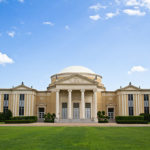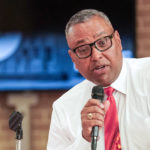Fallout from the Southern Baptist seminary presidents’ statement condemning critical race theory continues, as another group of Southern Baptists issued a statement decrying any movement that denies “the reality of systemic injustice” or historic links between the Southern Baptist Convention and racism.
“The Southern Baptist Convention was founded with injustice towards African slaves at its very core,” the “Justice, Repentance and the SBC” statement reads. “The SBC was founded, in large part, so that white, southern slave-holding Christians could appoint and support missionaries while continuing to hold their slaves in chains. This historical reality is neither disputed, nor can it be ignored.
“Yet, in the current moment, we see attempts to downplay this historical reality. Many people deny the existence of systemic injustice as a reality. Many who recognize systemic injustices are labeled as ‘Marxists,’ ‘Liberals’ and ‘Critical Race Theorists,’ even though they are theologically orthodox and believe in the sufficiency of Scripture.”
The statement acknowledges some “growth” in the area of social justice among Southern Baptists, but it asserts “the actions of some in the SBC appear to be more concerned with political maneuvering than working to present a vibrant, gospel-loving, racially and culturally diverse vision.”

The original 20 signatories of the statement include Fred Luter, senior pastor of Franklin Avenue Baptist Church in New Orleans and the first African American SBC president, and Dwight McKissic, senior pastor of Cornerstone Baptist Church in Arlington.
They issued the statement Dec. 18, the 155th anniversary of the proclamation of the 13th amendment to the U.S. Constitution, which abolished slavery. Within 24 hours, the number of individuals adding their signatures to the statement topped 200.
Their statement affirms a Dec. 11 statement from the National African American Fellowship of the SBC leadership and its “acknowledgment of systemic racism.”
“While some progress has occurred, some recent events have left many brothers and sisters of color feeling betrayed and wondering if the SBC is committed to racial reconciliation,” the “Justice, Repentance and the SBC” statement reads.
Chicago Baptist pastor ‘out’
Count Pastor Charlie Dates of Progressive Baptist Church in Chicago among them. The same day the “Justice, Repentance and the SBC” statement was released, Religion News Service published an opinion article by Dates calling the SBC seminary presidents’ statement on critical race theory “the final straw.”
Sign up for our weekly edition and get all our headlines in your inbox on Thursdays
Dates—who had led his church to align dually with the SBC, assuring older members that “the old SBC was fading—concluded he was overly optimistic in his earlier assessment.
“I had to tell my church I was wrong. There is no such thing as ‘the Old Southern Baptists,’” Dates wrote. “Conservatism is, and has always been, the god of the SBC.”
The seminary presidents’ statement—coupled with other recent actions by some SBC leaders—led Dates to a sad conclusion.
“As for me and the Progressive Baptist Church, I keep hearing the words of Harriet Tubman: ‘We out,’” he wrote. “The hard reality of the seminary presidents’ statement is that Black people will never gain full equality in the Southern Baptist Convention.”
Earlier the same week, Pastor Ralph West of the Church Without Walls in Houston, wrote a commentary in the Baptist Standard that went viral on social media. In it, West explained why he was withdrawing from Southwestern Baptist Theological Seminary and cutting ties with the SBC.
“What the SBC seminary presidents have done has brought division and confusion to the body of Christ,” West wrote. “They must repent and seek reconciliation with those who can properly inform them of the wrong they have done. They must ask the Lord to open their hearts to hear the truth of the gospel of Jesus Christ and how Jesus’ reign truly should impact our society.”
SBC leaders respond
SBC President J.D. Greear, who initially had endorsed the seminary presidents’ statement, posted a response to “A Statement on Justice, Repentance and the SBC” on his website urging all “Great Commission Baptists to carefully and soberly consider” what it says.

“We recognize that though worldly philosophies like critical race theory arise from worldviews in direct conflict with our own, there are often things we can learn from questions raised and observations made,” he wrote. “These are things we can discuss openly and learn together. As we do, we remain committed to judging all things by the Scriptures and bringing every thought captive to Christ.
“We must not default to labeling believers who parse certain questions differently ‘Marxist’ or ‘racist.’ This uncharitable spirit is not only intellectually lazy, it is a sin against the body of Christ. Great Commission Baptists can remain united around the inerrancy, supremacy and sufficiency of the Scriptures, even as we vigorously discuss the helpfulness and applicability of various insights.”
Baptist Press reported SBC Executive Committee President Ronnie Floyd scheduled a meeting early next month with officers of the National African American Fellowship, the seminary presidents and Greear.
“We have been clear in what we have said to a watching world, but now it is time for us to focus on our actions, specifically in how we relate to each other,” Floyd told BP. “Without relationships and conversations, we will not understand each other.”













We seek to connect God’s story and God’s people around the world. To learn more about God’s story, click here.
Send comments and feedback to Eric Black, our editor. For comments to be published, please specify “letter to the editor.” Maximum length for publication is 300 words.